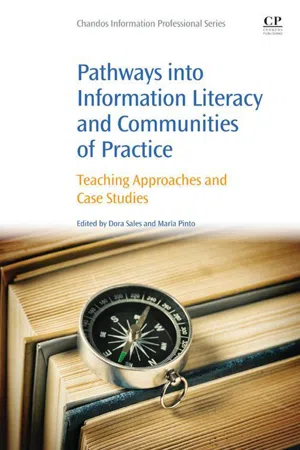Abstract
This chapter argues that information literacy is not comprised of a set of context-independent skills. Rather, it argues that information literacy is a way of thinking about information in relation to the context in which it is sought, interpreted, and evaluated. In making this argument, this chapter focuses on critical thinking, the ability to effectively evaluate information and research. It suggests that effective critical thinking crucially involves an awareness of the research conventions and practices of particular disciplines or communities and includes an understanding of the social, political, economic, and ideological context of the creation and dissemination of research. This chapter claims that neither the Association of College & Research Libraries (ACRL) Information Literacy Competency Standards for Higher Education nor the Framework for Information Literacy in Higher Education provides sufficient criteria for critically evaluating research. In so doing, it examines some of the specific contextual factors that affect, within communities of practice, which research questions are asked, research findings, and the dissemination of research.
1.1 Introduction
The central theme of this volume is “information literacy and communities of practice.” The conception underlying this phrase is that information literacy—the ability to retrieve, evaluate, and appropriately apply information—is not a decontextualized set of skills that is independent of the purpose and context within which information is sought, used, and evaluated. Within the higher education arena, the view of information literacy assumed here involves knowledge of the scholarly practices characteristic of particular disciplines: their methods of information-seeking, the kinds of information considered relevant, the principles for evaluating information, and the practices of scholarly communication within particular disciplines (cf. Grafstein, 2002). The ability to evaluate research in a way that is consistent with the research practices of particular disciplines is an essential component of this view of information literacy. I argue that this ability to effectively evaluate research crucially depends on an understanding of the research practices of particular disciplines and an awareness of the environment—the social, political, economic, and ideological context—that affects the creation and dissemination of research.
I have argued elsewhere (Grafstein, 2002) in favor of a discipline-based approach to information literacy, one that situates information literacy skills within disciplinary methodologies. However, as argued in Grafstein (2002), the concept of information literacy as generally described in the literature does not place a great deal of emphasis on the context of the community within which information is sought and evaluated. The literature promoting the importance of information literacy for libraries and education typically describes it as a generic set of skills that includes the ability to (1) identify and articulate an information need for a particular purpose, (2) understand how to find information sources that are appropriate to the information needed, (3) distinguish appropriate from inappropriate sources for a particular purpose, and (4) critically assess the information gathered (see, e.g., the Presidential Committee on Information Literacy: Final Report, 1989, and see Behrens, 1994 for a good overview of the development of information literacy up to that date). This chapter advocates an integrated view of information literacy that includes an understanding of the research needs and practices of particular disciplines and communities and a recognition of how the contextual factors noted above affect knowledge creation and dissemination within these communities of practice.
The focus here is on the critical evaluation of information and research and its relation to context. Recognition of the conceptual link between critical thinking and information literacy is neither new nor controversial. It is widely acknowledged that people are exposed to a myriad of often contradictory information—information that can have a significant impact of the decisions they make in their daily lives—on a wide variety of topics, including politics, health, education, and economics, to name just a few. In its seminal statement on information literacy in 1989, the American Library Association’s (ALA) asserted that only information-literate people would have the skills needed to evaluate this onslaught of seemingly chaotic information from diverse sources. According to the ALA’s Presidential Committee on Information Literacy, “in such an environment, information literacy provides insight into the manifold ways in which people can all be deceived and misled. Information-literate citizens are able to spot and expose chicanery, disinformation, and lies” (Presidential Committee on Information Literacy: Final Report, 1989). This statement effectively places critical thinking at the heart of information literacy.
However, despite the emphasis accorded to critical thinking in the information literacy literature, as well as in the Association for College & Research Libraries (ACRL) Information Literacy Competency Standards for Higher Education (2000) (http://www.ala.org/acrl/standards/informationliteracycompetency), critical thinking has not been explicitly defined in the library literature (see, e.g., Albitz, 2007). Perhaps one consequence of this lack of explicit definition is that the ACRL standards, which have had a dominant influence over the teaching of information literacy in higher education for the past 15 years, limit the description of the critical evaluation of information largely to the ability to recognize the authority and credibility of sources, with no reference to the interaction between information sources and their broader context. Although the standards do specify with respect to critical thinking, the “cultural, physical, or other context within which information was created,” and the 2015 Framework for Information Literacy for Higher Education (http://www.ala.org/acrl/standards/ilframework), places greater rhetorical emphasis on context and discourse communities, little attention has been paid to elaborating the role of context in the critical evaluation of information.
This chapter demonstrates how recognition of the context in which research occurs is crucial to the ability to evaluate it critically. It will show how effective critical thinking can only take place by situating research within the context of the discourses, cognitive structures, and research practices characteristic of particular disciplines. Additionally, we will see that the research practices of particular disciplines and communities of practice exist relative to the economic, ideological, and political context within which research is funded, created, and disseminated. An awareness of these factors, then, is essential to the ability to accurately assess research.
